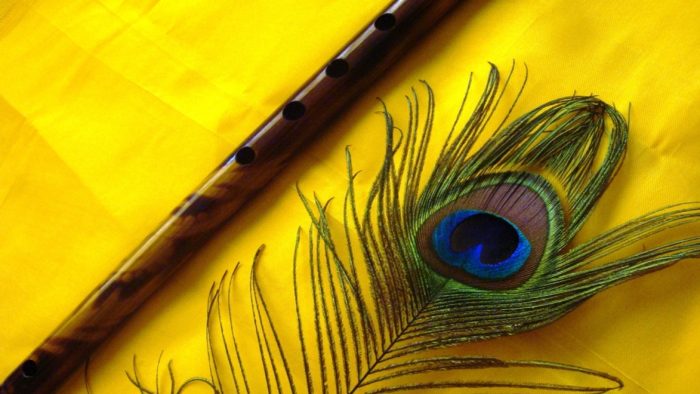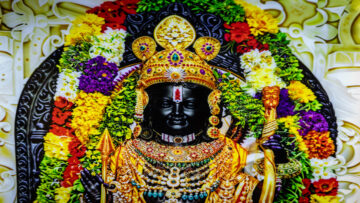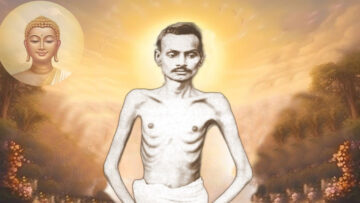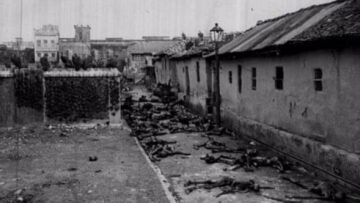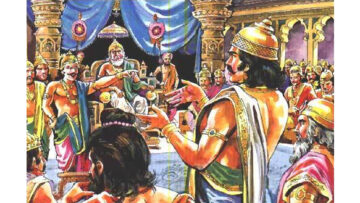“Who is playing the flute?”
The music flowed languid, irresistible in its ardor, yet tinged with a slight chill in the manner of a gentle breeze at the peak of spring. An inexplicable yearning took hold of me. I stood up. Whatever I had been doing till then was already forgotten. The tune grew louder and louder in my head. Helpless, as if led by an invisible rope, I was pulled out of my home. Very soon I found myself standing in the open, looking around, blinking in confusion.
Numerous cowbells tinkled faintly in the distance – a sweet, playful rhythm to that haunting flute. A gentle fog descended. I was enveloped in its heady scent, full of life, and promise. I breathed in the fragrance and looked up.
The crescent moon was sparkling in the jeweled sky. The light that shone from her felt almost solid as it descended from the heavens. In front of me, a path opened up within the argent mist. The music grew insistent, coiling tightly around a hollowness within me which I had not known until now to exist.
“Was I really so empty inside?”
My thoughts were interrupted by the sudden appearance of a peacock of ethereal beauty. His indigo skin shone in the moonlight. His feathers shimmered with the gentle breeze, the myriad colors resembling a tapestry made with threads of emerald, amber, rubies, and sapphires.
The peacock stared at me for what seemed to be an eternity, and then, with a tilt of his head, he beckoned me to follow him. The bird turned around and fluttered down the misty path, his body swaying with the ever-present music from that unseen flute.
No mortal could refuse that call.
I walked on the dew-washed path until I came across a riverbank. The peacock unfurled his feathers and began to dance with wild abandon. In the middle of the river, I could see a boat, occupied by a young fisher-girl and a middle-aged sage. I saw the latter fold his hands, and the girl gave a shy nod, and when their boat got swallowed by a bubble of fog. A double rainbow arched over the scene. The flute grew ecstatic.
One day the sage Parashar appeared at the riverbank. While the fisher-girl Matsyaganda was ferrying him over in her boat, the sage expressed his desire for her. He gave her the boon that her virginity will remain intact, and instead of the stench of fish, her body will emit a divine fragrance that will be felt across vast distances. Sage Krishna Dwaipayana, who would later compile the Vedas and be known as Veda Vyasa and go on to compose the Mahabharata, was born out of this union.
That sweet spell broke after a while. The music was now filled with an ominous presence, pregnant with possibilities – as if the flautist was pleading us to stop an approaching disaster. My heart was filled with unease. The peacock stopped dancing, her outstretched feathers collapsing suddenly. He beckoned me again and flew along the banks of the river.
I followed him with all the haste I could manage and finally reached a large hut. A golden chariot drawn by proud white horses stood outside. In the distance, warriors and chieftains waited expectantly. The peacock was sitting on a window sill, his expression inscrutable.
There were three people inside the hut – the fisher girl from before, now slightly older than when we last saw her, an elderly man who was clearly her father, and a powerful-looking young man of exceptionally noble bearing clad inexpensive clothes. As I watched on, the young man fell to the feet of the fisher girl and called her mother. Lightning flashed. Thunder rent the heavens. A howling wind screeched above the music of the flute, countless dry leaves whispering in its wake, whispering in horror…
“No, No, No… Devavrata what have you done…”.
A few years later, King Shantanu, the ruler of the Kuru kingdom and descendant of the Bharata race in the lunar lineage fell in love with the former Matsyagandha, more commonly known as Satyavati. Her crafty father put a condition for marriage that only her offspring will be entitled to the throne of Hastinapur. Knowing that his firstborn, the son of Ganga, Devavrata, was eminently suited to be the next king, Shantanu refused and fell under a pall of depression. Devavrata came to know of his father’s predicament and approached Satyavati and her father directly. He gave up his claim to the throne and declared that he would remain celibate for his entire life so that any potential conflict due to his bloodline is eliminated. From this point onwards, he came to be known as Bhishma, the one who had taken a terrible oath.
The peacock and I found ourselves in an enchanting forest once the storm subsided. The flute was playing a mournful tune as if resigned to a tragedy. I heard the sound of a waterfall and set off in that direction. The peacock followed me somewhat reluctantly. After traversing a little distance, we reached a glade where we found two weeping women, the younger of them cradling the head of a dead man on top of a funeral pyre.
They were surrounded by five crying children, the youngest twins being mere toddlers. The pyre burst into flames, consuming the man and the woman. The older woman tore away the few flower ornaments she was wearing, and cradling the twins, walked away with resolute steps. The three older kids followed her, each with a different emotion in his eyes – sadness, anger, and curiosity.
The flute stopped playing.
Chitrangad and Vichitravirya, the two offspring of Shantanu and Satyavati, died heirless. To avert a political crisis, Hastinapur needed an heir. After failing to convince Bhishma to break his vows, Satyavati called upon her son from her union with sage Parashar, Krishna Dwaipayana, to impregnate the widows of Vichitravirya, Ambika, and Ambalika. Thus, the lunar bloodline of the Kurus was lost forever.
Pandu, the son born of Ambalika, was cursed by the sage Kindama to perish the moment he let himself be overcome by lust. He abdicated his throne in favor of his elder brother, Dhritarashtra – the blind son of Ambika, and left for the forest with his two wives – Kunti and Madri. By divine grace, Pandu obtained five children who came to be known as the Pandavas, yet he succumbed to his desires soon after, approaching Madri with the intent to make love to her, and fell dead instantly, bringing the curse to fruition. Kunti, all alone in the world except her five children, returned to the palace of Hastinapur as a helpless widow.
I was shocked to see my friend the peacock crying, tears turning into fragments of lapis lazuli as they hit the marble floor of the great gambling hall. One by one his feathers shriveled and fell away as if their very beauty was stained by the poison unfolding before us. A burly thug was trying his best to forcefully disrobe a woman in public.
Five brothers sprawled helplessly near her feet, the eldest staring blankly at the pair of dice clutched in his hands. Across them sat a hundred of their cousins, ogling at the humiliation meted out to the woman, vicious happiness scarring their faces. Surrounding them all stood their relatives and teachers, frozen like statues in their respective places, mute presence underlining their abject impotence.
I was witnessing the heart-wrenching victory of silence.
Oh, not silence in the literal sense, because in truth, one could hear many sounds. The decorative flags flapped in the meaningless way they do. Uncouth laughter filled the air, punctuated by shameless titters within the gathered crowd. The young woman was crying out in rage and grief, but the blind king on the throne kept asking – “Did we win? Did my son win?”
However, all these sounds receded to the background of my consciousness. All I could hear was a deafening silence that formed the foundation of whatever was happening in front of me. A silence that stretched infinitely in all directions, consuming the so-called elders, the sages, the wise men, the protectors, the devout, and the warriors.
Perhaps God himself was a part of that helpless silence. I clutched my ears and shut my eyes, unable to comprehend the absence of a physical manifestation of the moral tragedy that we were witnessing. All that had happened had led to this moment, and all that will happen will flow from here.
“Oh, where is that beautiful flute? Why did the music stop?”
From the very beginning, the Pandavas and their cousins, the sons of Dhritarashtra, the Kauravas, became entangled in bitter conflict. Led by the jealous Duryodhana, the Kauravas planned and plotted relentlessly to get rid of the Pandavas. When they grew up, the very kingdom of Kuru was partitioned so that the two sets of brothers could live in peace. However, that was not to be. Jealous of their prosperity, Duryodhana invited the Pandavas to a game of dice, which, being royalty, the Pandavas couldn’t refuse. The eldest Pandava, the gambling addict Yudhistira, lost all their wealth, kingdom, and even their own selves in that ill-fated game of dice. Worse, he even gambled away their wife Draupadi, who was humiliated in front of the world by the Kauravas. In the end, the Pandavas were exiled to the forest for twelve years, to be followed by a year spent incognito.
The flute began to play again. But now the music was filled with dark foreboding. A catastrophe was approaching. The peacock, shriveled and shivering, curled about himself and died. With my own fingers, I dug a grave beneath a banyan tree and buried his innocent remains. As I contemplated my muddy hands, I heard two vultures talking among themselves.
“At least we will not have to worry about food – that Duryodhana did not listen to anybody, not even Keshava. Now the war is inevitable. We are in for a treat!”
“What are you saying! You want to eat the flesh of those who have fallen in a holy war – a Dharmayuddha!”
“Pah! Dead flesh is dead flesh. Why should we care about how or where they perished? If you won’t eat someone else will, and then you and your family too will become food for someone else.”
Cackling in this manner, they left in the direction from where the music was coming.
Taking one last look at the grave of my friend, I began to trudge in their wake.
Duryodhana refused to relinquish the Pandava’s share of the kingdom even after they completed their thirteen years of exile successfully. In a final, desperate attempt to stave off war, Vasudeva Krishna himself arrived at Hastinapur to negotiate. His mission ended in failure. An insatiable vortex opened its bloody maw at Kurukshetra. Messengers rushed to all the kings of India, requesting their support in the upcoming conflict. Long-held grudges, hidden rivalries, ancient insults, and the vagaries of uncaring chance all became unseen but inexorable chains that dragged the entire warrior class of the country to that battlefield. Armies began to march for one camp or the other. It was time for the final reckoning.
The stench of the dead told me that I had arrived at the Kurukshetra. A howling sorrow raged like a typhoon unseen, seething with the wail of widows. The vultures fluttered gleefully above an ocean of blood, dotted with countless pyres, each a fiery island of remembrance to a fallen warrior. Amidst those pillars of sandalwood smoke, I ran helter-skelter, trying to find the source of the now heart-rending flute.
There! In the distance I could see him – a cowherd weeping into the flute, surrounded by a grief-stricken mass of humanity, each pointing accusatory fingers at him. For a moment it looked like his shoulders had almost sagged under the burden of those accusations, but then he straightened himself and accepted the weight of the world.
I turned around, not daring to reach out to him. Sudden tears filled my eyes. I blinked furiously, telling myself that they were the result of the smoke from the pyres. When I could see clearly again, I found the past stretched out before me like a panorama on a silk weaver’s loom – vibrant colors and delicate threads inviting me to create my very own reality as I pleased.
What if Satyavati had refused sage Parashar?
What if Devavrata had put his responsibility as a ruler above his love for his father?
What if Pandu hadn’t succumbed to his desires?
What if Yudhistira hadn’t lost his senses at the game of dice?
What if Duryodhana accepted the peace proposals?
What if… What if… What if…
I reached out to touch the past. The vision shattered.
I am now back at my home. The faint echoes of the flute are but fading whispers in my memory – already unattainable. Did I really hear it? The only answer I get is an unknown, aching void.
I am filled with questions. Are we simply passengers on a pre-built path of destiny – inescapably trapped by both the wisdom and the follies of the past? Certainly, it is comforting to believe so. We look back at history – raging at failures and celebrating victories, and then comfortably drawing conclusions – “that had happened in the past, so this is happening in the present.”
Linear causality becomes our excuse of being, the immortal past with its myriad interpretations and justifications a supermarket of excuses.
I guess that is why itihasa like the Mahabharata is important. If we have a record of how the past unfolded, then maybe we will get the courage to act differently when confronted with those very same problems that are as pertinent today as they were in the past.
Self-righteous pride, a bad boss, the temptations of life, family rivalry, bad friends, a jealous society, the blind justice system – is our present-day reality so much different from the era of Krishna Dwaipayana?
Every tragedy in Mahabharata occurred because good men failed to act in a righteous manner in a moment of crisis, independent of the past that had led him or her to that particular point. If only one among them had risen to the occasion, perhaps the final bloodbath could have been avoided. It takes many bad decisions piled on top of each other to lead to a Kurukshetra, but only one wise decision to avert it.
Perhaps that is what Veda Vyasa is promising us. Instead of looking at our present as the result of a relentless chain of consequences, what if we assume that every action that we undertake today has its own unique potential of preventing a future catastrophe? What if we imagine each one among us to be discrete parts of a continuous system, so that even one person, acting in a righteous manner, can alter the course of history?
It is this potential for good that carries within it the promise of a just society. The sanatan worldview doesn’t conceive humanity to be inherently sinful – instead, it believes in the capacity of the individual to drive positive change in the entire society. Was that not what the cowherd had demonstrated? Did he not act when others dithered?
Did he not take uncomfortable decisions – against traditions, against what was popularly believed to be honorable, against what was the easy way out? In our darkest moments of doubt and helplessness, oh so common in this raging Kali Yuga, what else but the actions of the cowherd can provide us with hope?
That one good man, acting righteously, can and will make a difference.
It is the best kind of hope which can possibly exist.
After all, to read the Mahabharata is to make a promise – “We will not remain silent in the gambling hall.”
And then you will hear the flute play again.
Image Credits: Flickr – Seema M
Disclaimer: The opinions expressed in this article belong to the author. Indic Today is neither responsible nor liable for the accuracy, completeness, suitability, or validity of any information in the article.

